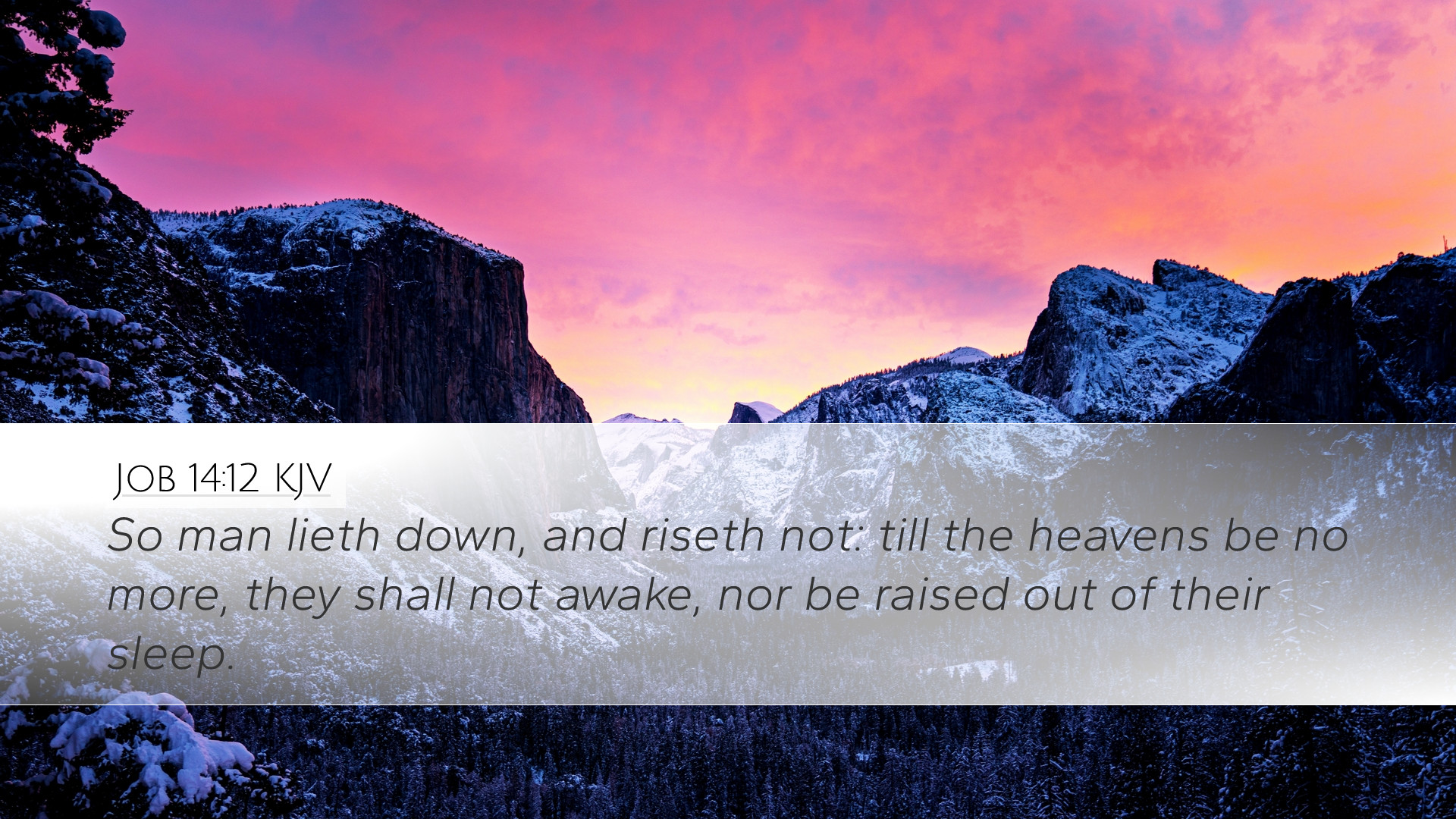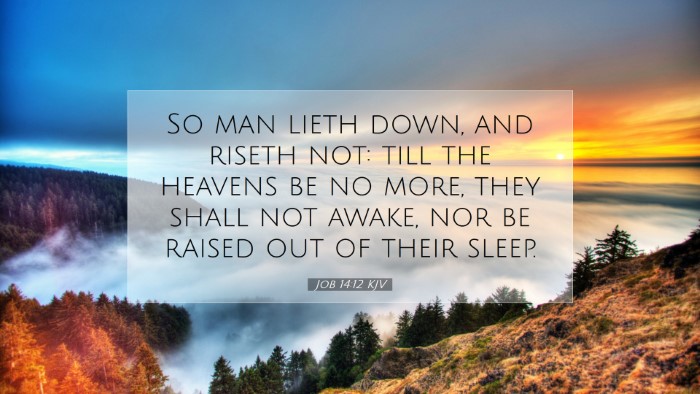Old Testament
Genesis Exodus Leviticus Numbers Deuteronomy Joshua Judges Ruth 1 Samuel 2 Samuel 1 Kings 2 Kings 1 Chronicles 2 Chronicles Ezra Nehemiah Esther Job Psalms Proverbs Ecclesiastes Song of Solomon Isaiah Jeremiah Lamentations Ezekiel Daniel Hosea Joel Amos Obadiah Jonah Micah Nahum Habakkuk Zephaniah Haggai Zechariah MalachiJob 14:12
Job 14:12 KJV
So man lieth down, and riseth not: till the heavens be no more, they shall not awake, nor be raised out of their sleep.
Job 14:12 Bible Commentary
Commentary on Job 14:12
Job 14:12 (ESV): "So a man lies down and rises not again; till the heavens are no more, they will not awake or be roused out of their sleep."
Introduction
This verse encapsulates a profound moment in the Book of Job, depicting the finality of death and the nature of human mortality. Job, in his suffering, reflects on the inevitable fate that awaits all mankind, drawing a somber picture of life and death. This commentary seeks to elucidate the theological and existential implications of this verse by synthesizing insights from Matthew Henry, Albert Barnes, and Adam Clarke.
The Nature of Death
Matthew Henry's Perspective: Henry posits that Job's statement illustrates the finality of death, emphasizing that when a man dies, he cannot rise again until a more profound intervention takes place, namely the resurrection. He suggests that this notion reflects the general belief in the Old Testament concerning the afterlife, where the dead remain in a state of unconsciousness until the resurrection.
Albert Barnes' Insights: Barnes underscores the permanence of death as delineated by Job. He notes that Job acknowledges a deep sense of hopelessness about life after death, seeing death as a sleep from which one will not awaken until the end of time. Barnes also emphasizes that this grim perspective serves to highlight Job’s intense suffering and the questions regarding divine justice that underpin his dialogue with God.
Adam Clarke's Analysis: Clarke complements the thoughts of Henry and Barnes by examining the implications of 'sleep' as a metaphor for death. He argues that the description of death as ‘sleep’ signifies not only a cessation of ordinary activity but also a promise of awakening—a concept more fully realized in the New Testament. Clarke suggests that Job's lament should spur the faithful to seek understanding of redemption and resurrection in the light of Christ's victory over death.
Theological Implications
This verse touches upon critical theological themes relating to mortality, divine justice, and the hope of resurrection. It invites pastors, students, and theologians to reflect on the nature of human existence in the shadow of death.
- Mortal Existence: Job's contemplation signals the transient nature of life and encourages a deeper reflection on one’s priorities and pursuits. The emphasis on sleep serves as a reminder that life is fleeting and should be approached with wisdom.
- Divine Justice: Job's despair leads to critical questions about God's justice. His assertion that man does not awake challenges our understandings of divine timing and the nature of suffering.
- The Hope of Resurrection: The reference to rising again hints at a need for future hope. While Job’s tone captures despair, it also breeds curiosity about ultimate redemption, which finds fulfillment in Christian eschatology through the resurrection of Jesus Christ.
Practical Applications
Job 14:12 is rich in lessons for the contemporary believer. Here are several applications drawn from the commentary:
- Contemplating Mortality: Believers are encouraged to reflect on their lives in light of eternity. Understanding the temporality of one’s existence prompts a pursuit of meaning beyond worldly achievements.
- Addressing Grief: This passage addresses the themes of loss and grief, helping ministers provide comfort to those mourning. It invites the use of scripture to remind individuals of the promise of resurrection in Christ.
- Encouraging Hope in Despair: Like Job, believers may encounter suffering that leads to existential questioning. It is crucial for spiritual leaders to guide their congregations back to the hope found in God's promises, even when circumstances seem dire.
Conclusion
Job 14:12 stands as a poignant reminder of human mortality and the eternal hope offered through faith. As we reflect on Job’s insights regarding death and awakening, let us also be mindful of the broader narrative of redemption woven throughout Scripture. Engaging with this verse allows pastors, students, theologians, and scholars to deepen their understanding of life, death, and the perpetual hope found in the resurrection.


